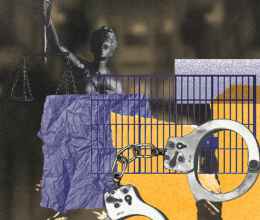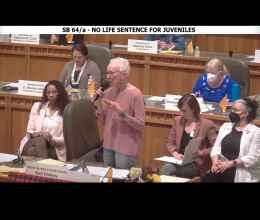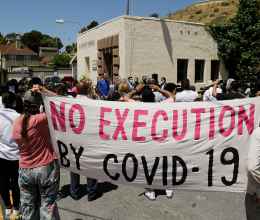CONTACT: Micah McCoy, (505) 266-5915 Ext. 1003 or [email protected]
LAS CRUCES, NM – The ACLU of New Mexico (ACLU-NM) and Disability Rights New Mexico (DRNM) settled their lawsuit against the Doña Ana County Detention Center (DACDC), securing essential mental health services for detainees. The settlement marks the end of a lawsuit brought as a class action by detainees who alleged that DACDC failed to provide adequate treatment for inmates with mental health disabilities. Under the terms of the settlement, DACDC will improve its intake screening process and provision of treatment, and it will modify segregation cell use as well as seclusion and restraint procedures to comply with constitutional standards and the Americans with Disabilities Act.
“We are very pleased that Doña Ana County has agreed to take these important steps towards providing detainees with adequate mental health care,” said ACLU-NM Executive Director Peter Simonson. “These reforms will go a long way towards ensuring that detainees with mental disabilities are diagnosed and given proper care. We expect these changes to make the Doña Ana County Detention Center a safer and healthier facility.”
The settlement agreement mandates that DACDC implement standard screening procedures in its intake process in order to identify at the outset which detainees require treatment for mental disabilities. This will ensure that detainees receive immediate attention and avoid a deterioration of their condition that could put themselves, security staff and other detainees at risk. The agreement also requires that detainees with significant mental health disabilities be housed in a specialized mental health unit within the detention center and that they be supervised by corrections officers who have undergone special training regarding mental health issues.
A key achievement of the settlement was an assurance that placement in isolation cells — used inappropriately throughout the nation when dealing with detainees or inmates with mental disabilities — will not be used for detainees with mental disabilities unless all other less restrictive options have been exhausted. In addition, when physical restraint becomes necessary, corrections officers will only hold detainees until a trained medical professional is able to diagnose and administer treatment.
“Disability Rights New Mexico has been responding to concerns about inadequate mental health care in DACDC since 2004,” said Nancy Koenigsberg, DRNM Legal Director. “DACDC is now required to maintain an adequate level of mental health services staffing. It also has a continuum of care of mental health services in the facility, as well as provisions for transferring detainees to acute care out of the facility when clinically indicated. These are very important services for detainees with mental disabilities. We also hope this may help with recidivism.”
A neutral expert in prison mental health care will be agreed upon by both parties and contracted to monitor and evaluate DACDC progress in the implementation of these reforms over the next two years. DRNM will oversee the monitoring process.
ACLU-NM Staff Attorney Brendan Egan, Disability Rights New Mexico Attorneys Nancy Koenigsberg and Tim Gardner, the Bazelon Center for Mental Health Law and ACLU-NM Cooperating Attorneys George Bach, Peter Cubra and Michael Lilley represented the plaintiffs in this case.
###
Related Documents:







